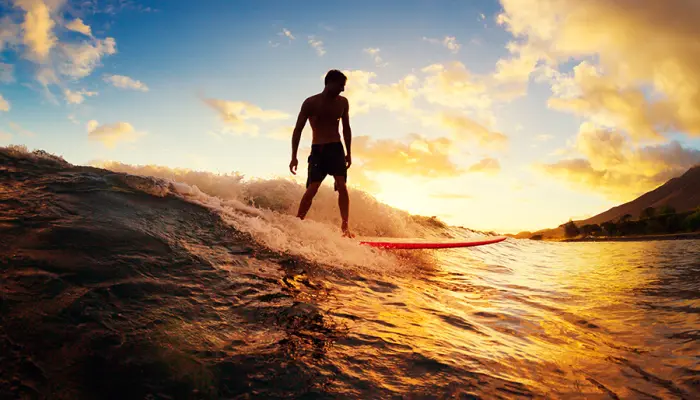Surfing might seem like a simple activity, so for a surf trip, you often don't need to bring anything special besides a swimsuit and beach accessories. Nevertheless, we've compiled a list of 10 things to keep in mind during your surfing journey.
1. Pack Beach Essentials
Although you usually don't wear clothes under a wetsuit, it's good to have some light beachwear to put on when you're not surfing. This way, you can warm up after swimming in cool water or shelter from the scorching sun. Also, don't forget high SPF sunscreen, polarized sunglasses to protect your eyes, a large beach towel, and a light, breathable hat or cap.
2. Be Ready When the Vans Leave
As most surf camps head out early in the morning to find suitable waves, you'll miss a whole day of surfing if you're late. To catch your share of surfing, try to wake up early and be ready at the designated departure time. Clarify the departure schedule in advance and start getting ready well beforehand.
3. Mingle with the Group
A surf tour almost always involves socializing and meeting new people. Be prepared to meet many interesting personalities from all over the world who are passionate about surfing. Be open to new acquaintances and don't hesitate to initiate conversations. This will make your vacation much brighter and more fulfilling. One of the best advantages of surf camps (in our opinion) is quickly entering a friendly community of like-minded people. However, this doesn't mean you should always be around people - try to find a balance between socializing and time for yourself.
4. Don't Forget Sunscreen for Your Feet
One place where surfers often get sunburned is the tops of their feet. This is especially relevant if you surf barefoot in a wetsuit, as your feet remain exposed to the sun. Therefore, don't forget to thoroughly apply high SPF sunscreen not only to your face, neck, and other exposed body parts but also to the tops of your feet before each surfing session.
5. "Popping Up"
If you're a beginner, you'll likely spend much of the first week practicing the technique of popping up. This is one of the most important and challenging elements for beginners. It's the action where you transition from lying on the board to standing in one smooth motion. Once you master this skill, a new world of real surfing opens up to you, so listen carefully when your instructor explains the technique, remember all the nuances, and practice until the movements become automatic. If something remains unclear, don't hesitate to ask your instructor again and again.
6. Be Honest About Wetsuit Size
Choosing the right size wetsuit is directly related to the effectiveness of popping up. If the suit is too small, it will restrict your movements and significantly limit your flexibility. This can seriously hinder a smooth and quick pop-up while maintaining balance on the board. If you're unsure about the size, always consult with an instructor - it's very important for safe and comfortable surfing.
7. Have Realistic Expectations
Surfing is a complex and practice-intensive activity, so don't expect too rapid progress. Usually, it takes 1-2 weeks of intensive training before you learn to confidently stand on the board and catch waves. Don't get discouraged and lose motivation if you're not surfing like a pro after a couple of days. In surfing, all skills come with experience. And we promise - riding a big powerful wave just once will imprint the thrill and desire to progress for a lifetime!
8. Don't Hesitate to Ask Questions
If you've come to learn to surf, then surf instructors are there specifically to help you at every stage of learning. Don't be afraid to frequently turn to them for advice and clarifications - there are no silly questions for beginners. In fact, the more you're curious and clarify unclear points, the faster you'll master the basic technique. It would be a disaster if you were too shy to clarify some crucial detail that could help you understand the technique and overcome a key barrier.
9. If You've Surfed Before - Assess Your Level Objectively
If you already have some experience in surfing, it's very important to accurately assess your current skill level. Don't overestimate your abilities and take on waves that are too difficult for you. This is not only unsafe but can also slow your progress if you regularly fall off the board due to lack of preparation. Start with waves that match your skills and gradually increase the difficulty as you progress.
10. Safety First
Surfing is an extreme sport with certain risks, so safety is of paramount importance. All instructors in surf camps are certified lifeguards with extensive experience. They know the coastline well and can anticipate dangerous situations. If an instructor says it's unsafe to go into the water due to big waves, strong currents, or other risk factors, it's best to heed their advice. Don't be reckless and risk your life for one ride.
By following these 10 tips, you'll be well prepared for your surf trip. Be careful, heed the instructors' advice, and enjoy riding the waves!
